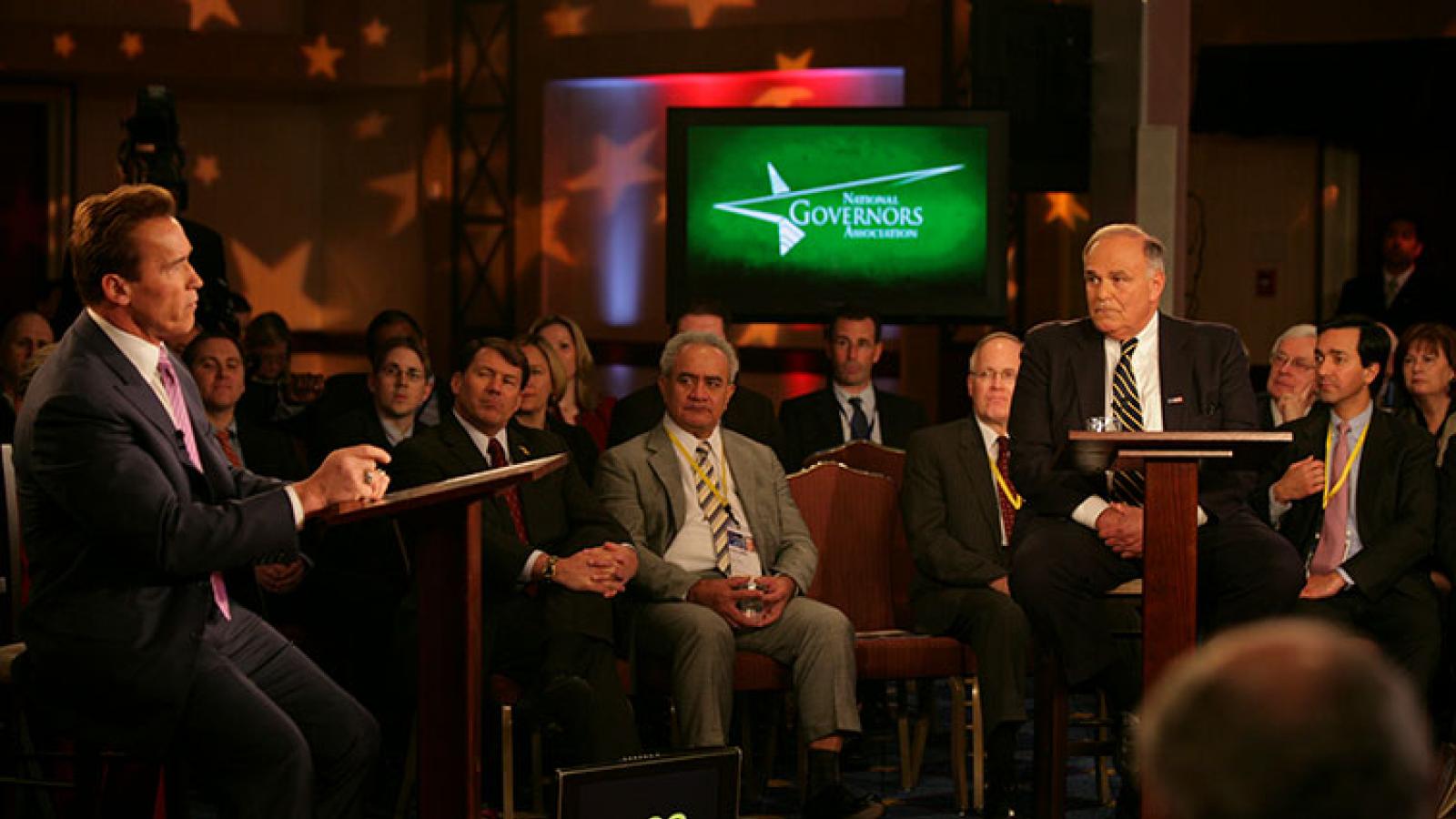Infrastructure: National Discussion and Debate Series
America's infrastructure is in grave disrepair. Analysts have determined that one-third of the nation's roads are in poor or mediocre condition, and the Federal Highway Administration recently estimated that one out of every four bridges is either structurally deficient or functionally obsolete. Every infrastructure sector, from rail, air and seaways, to water supply, sewage and irrigation, to energy pipelines and the electric grid, are in need of significant capital. The American Society of Civil Engineers says it will take an investment of $1.6 trillion over the next five years – double the current outlay – just to bring the nation's infrastructure to acceptable levels. This figure even excludes innovative projects like high-speed railways, GPS integration, and broadband expansion.
Resolved: Government at all levels must work together to create a comprehensive infrastructure policy in concert with national energy, environmental, and economic priorities
Arguing for the resolution:
Edward G. Rendell is serving his second term as Pennsylvania's 45th Governor, overseeing a $28.3 billion budget in the nation's sixth-most-populous state. His strategic investments have energized Pennsylvania's economy, created jobs, revitalized communities, improved education, protected the environment, and expanded access to health care for children and affordable prescription drugs for older adults. Governor Rendell is also working to create jobs in the emerging alternative energy economy and develop strategies to reduce dependence on foreign oil and save families money. Rendell was the 121st Mayor of the City of Philadelphia (1992–99), eliminating a $250 million deficit; balancing the city's budget and generating five consecutive budget surpluses; reducing business and wage taxes for four consecutive years; implementing new revenue-generating initiatives, and improving services to neighborhoods. The New York Times called the Philadelphia renaissance under Rendell "the most stunning turnaround in recent urban history." Before serving as Mayor, Rendell was elected district attorney of the City of Philadelphia (1978–85).
The world knows Arnold Schwarzenegger as a bodybuilder and a Hollywood action hero, but he is also a successful businessman, philanthropist and California's 38th Governor. Governor Schwarzenegger's most notable accomplishments include helping to reach a bipartisan agreement to reduce California's greenhouse gas emissions, increasing the minimum wage while lowering the state's unemployment rate and overhauling the workers' compensation system – cutting costs by more than 35 percent. Schwarzenegger is the first Governor in decades to make major investments in improving California's aging infrastructure through his Strategic Growth Plan, aimed at reducing congestion and cleaning the air. He also established the Hydrogen Highway and Million Solar Roofs Plan. As Governor, he has been California's most effective ambassador, traveling across the country and around the world promoting California-grown products, cutting-edge technologies and diverse travel destinations. Governor Schwarzenegger earned a college degree from the University of Wisconsin and became a United States citizen in 1983.
Arguing against the resolution:
JayEtta Hecker is a Senior Fellow at the Bipartisan Policy Center, an Adjunct Fellow at the Rand Corporation, and an independent consultant working to develop strategies for improving the economic performance of U.S. transportation networks. From 1982 to 2008, Hecker served in the U.S. Government Accountability Office. Her positions at GAO included Director of International Relations and Trade (1993–99), Director of Government Business Operation (1999–2000), and Director of the Physical Infrastructure Team (2000–08). As head of the Physical Infrastructure Team, she was responsible for directing GAO work related to all transportation modes including federal highways, transit, freight and passenger rail, aviation, and maritime issues. Hecker testified frequently before Congress and regularly spoke to professional associations and the media. Prior service includes the U.S. Regulatory Council (1979–81), Commodity Futures Trading Commission (1976–79), and the U.S. Agency for International Development (1971–76).
Douglas Foy is the President and founder of Serrafix, a consulting firm working to transform America's energy profile. At Serrafix, Foy has helped a variety of cities, including New York, Milwaukee, and Cambridge, Mass. to implement large-scale energy savings plans. Foy served as the first Secretary of Commonwealth Development in the administration of Massachusetts Governor Mitt Romney, where he oversaw the agencies of Transportation, Housing, Environment, and Energy. Foy's agencies developed the Commonwealth's first comprehensive transportation plan emphasizing transit; the nation's most comprehensive climate action plan; and numerous programs, policies, and investments to promote sustainable development and smart growth. Before his work in state government, Foy served for 25 years as the President of the Conservation Law Foundation (CLF), the first regional environmental advocacy organization in the nation. For this work, Foy received the President's Environmental and Conservation Challenge Award, and the Woodrow Wilson Award for Public Service.
Moderator:
Until his 1995 retirement, Robert MacNeil was executive editor and co-anchor of The MacNeil/Lehrer NewsHour, a 20-year nightly partnership with Jim Lehrer on PBS. He began his 40-year career as a correspondent for Reuters, NBC News, and the BBC before joining PBS in 1971. There, he teamed with Jim Lehrer to co-anchor public television's Emmy-winning coverage of the Senate Watergate hearings. Their collaboration led to The MacNeil/Lehrer Report, launched in October 1975. Eight years later, the program became The MacNeil/Lehrer NewsHour, the nation's first full hour of evening news. They founded MacNeil/Lehrer Productions and produced many programs broadcast on PBS, network, and cable television. MacNeil's honors include Peabody Awards, a Dupont-Columbia Award and the Fred Friendly First Amendment Award. He was inducted into the Television Academy Hall of Fame with Jim Lehrer in 1999. MacNeil has written several books, and his memoir, Looking for My Country: Finding Myself in America, was published in 2003.
